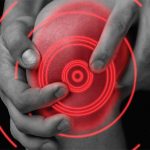(Reuters Health)—People suffering from osteoarthritis, the most common type of joint inflammation, are more likely to have knee pain when they also have difficulty getting enough sleep, a study suggests.
Researchers found that people with knee osteoarthritis and insomnia were also more likely to suffer from a nervous system disorder called “central sensitization” that makes them more sensitive to pain and lowers their threshold for tolerating discomfort.
“Knee osteoarthritis patients with insomnia have more pain and worse physical function than knee osteoarthritis patients without insomnia,” lead study author Claudia Campbell, a psychiatry researcher at Johns Hopkins University School of Medicine in Baltimore, said by email.
Osteoarthritis is a degenerative disease that erodes cartilage, the slippery tissue that covers the ends of bones in a joint, causing pain, swelling, loss of motion and bone spurs. It is associated with aging. It typically strikes the most used joints, including the knees, hips, fingers and lower spine.
Globally, about one in 10 men and one in five women over age 60 have osteoarthritis, one of the leading causes of disability in developed nations, according to the World Health Organization.
About a third of adults have insomnia, or difficulty falling or staying asleep, at least briefly. Around one in 10 people have chronic insomnia that’s more severe, striking at least three times a week for three months or more, according to the American Academy of Sleep Medicine.
Campbell and colleagues compared pain in four groups: 118 patients with insomnia and knee osteoarthritis, 31 people with the joint disorder but normal sleep patterns, 30 healthy people with insomnia, and 29 healthy individuals with no trouble sleeping.
People with insomnia took more than 30 minutes to fall asleep, or they had at least two awakenings a night of more than 15 minutes or at least one awakening for more than 30 minutes – and they had these problems on at least three nights a week for a month or more.
Healthy patients in the study had no history of chronic pain over the past three years and no major medical or psychiatric illnesses.
Study participants kept sleep diaries, did one-night sleep studies in a laboratory to verify the quality of rest they got, and took pain threshold tests using heat and cold.
The knee osteoarthritis patients were significantly older than their healthy peers, reported higher levels of pain and depression, and were more likely to be overweight.
Among participants with insomnia, those who also had knee osteoarthritis reported more sleep interruptions and had less “sleep efficiency,” the authors report in the journal Arthritis Care and Research.
Sleep efficiency is determined by how much time you spend asleep after you go to bed and turn the lights off.
Researchers also measured signs of what’s known as central sensitization, a nervous system condition linked to long-term exposure to chronic pain that makes people have a lower pain threshold.
Patients with knee osteoarthritis and insomnia were most sensitive to pain, based on assessments of central sensitization, the study found.
While sleep patterns have long been linked to pain perception, the study sheds new light on how insomnia transforms pain perception through central sensitization in people with knee osteoarthritis, said Dr. Gillian Hawker, a researcher in musculoskeletal diseases at the University of Toronto who wasn’t involved in the study.
But the study can’t prove that insomnia causes pain, because it’s hard to say which problem developed first, Hawker said by email.
“People with a lot of joint pain have difficulty sleeping, which can result in greater fatigue and depressed mood and pain severity,” Hawker said. “Physical activity, which is the primary therapy for knee osteoarthritis, helps sleep, pain, mood and functioning.”



